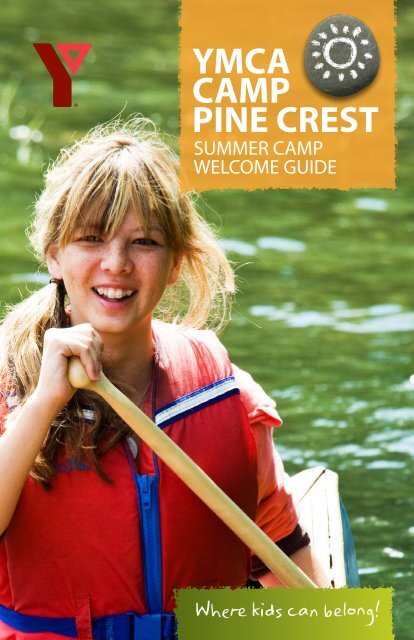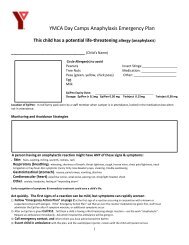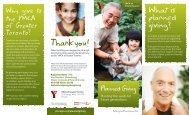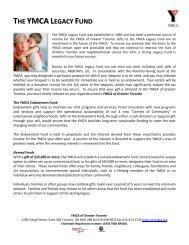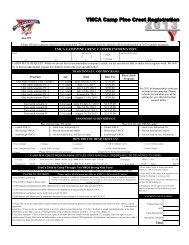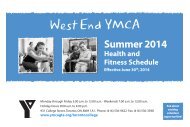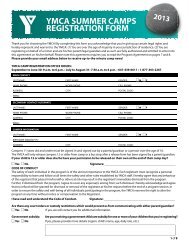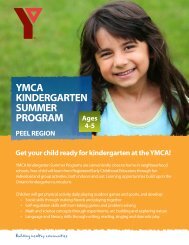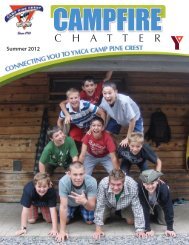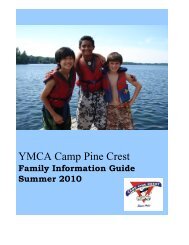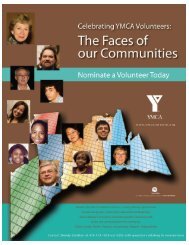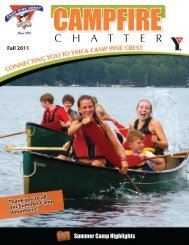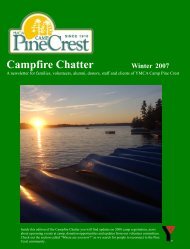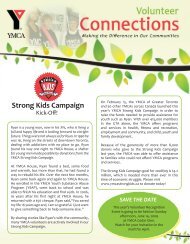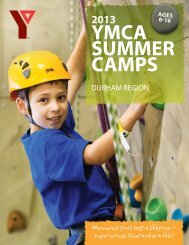2013 Summer Camp Welcome Guide - YMCA of Greater Toronto
2013 Summer Camp Welcome Guide - YMCA of Greater Toronto
2013 Summer Camp Welcome Guide - YMCA of Greater Toronto
- No tags were found...
You also want an ePaper? Increase the reach of your titles
YUMPU automatically turns print PDFs into web optimized ePapers that Google loves.
<strong>YMCA</strong>CAMPPINE CRESTSUMMER CAMPWELCOME GUIDEWhere kids can belong!
TABLE OFCONTENTS<strong>Welcome</strong> to <strong>YMCA</strong> <strong>Camp</strong> Pine Crest!Information Sessions<strong>YMCA</strong> <strong>Camp</strong> Pine Crest Guiding PrinciplesExpectations at <strong>Camp</strong>Packing and Preparations — a <strong>Guide</strong> for ParentsTransportationHealth and Safety at <strong>Camp</strong>Program Options pageTypical Day at Pine CrestOrientation Day ActivitiesLeadership and Adventure Leadership ProgramsContact with <strong>Camp</strong>Directions to <strong>Camp</strong>MapPage 3Page 4Page 5Page 6Page 7-11Page 11Page 12-14Page 14-17Page 17Page 17-18Page 19Page 20-22Page 23Back cover2
<strong>Welcome</strong> to<strong>YMCA</strong> <strong>Camp</strong> Pine Crest!This guide is for campers and parents to help prepare for camp thissummer. Whether it’s your very first time away at camp or you’re areturning camper, this guide will answer your questions.Being at camp is very different than being at home. We sleep in cabins <strong>of</strong>8-10 people, eat in a large dining hall with close to 300 people, and areoutside most <strong>of</strong> each day with the bugs! This type <strong>of</strong> lifestyle means thatwe work together to ensure that everyone’s camp experience is positive.We expect all campers and staff to treat each other with respect and helpothers enjoy their time away from home.We hope you return to your parents with greater confidence, newfriendships and excitement that will keep you wanting to return to campyear after year!If you’re feeling nervous about going away for the first time, please visitus at our Family Information Nights throughout <strong>Toronto</strong> or our OpenHouse Days at camp in June and August. You can also see pictures on ourwebsite at www.camppinecrest.ca and on Facebook. Please give us a callanytime with questions.Take care and we can’t wait to see you!Coel Balmer, Laura Cottes, Anne Coleman705-762-3377 / 877-878-9622camp.pinecrest@ymcagta.org3
<strong>YMCA</strong> <strong>Camp</strong> Pine Crest Guiding Principles<strong>YMCA</strong> mission statementThe <strong>YMCA</strong> <strong>of</strong> <strong>Greater</strong> <strong>Toronto</strong> is a charity <strong>of</strong>fering opportunitiesfor personal growth, community involvement and leadership.Our success is built on our commitment to the mission <strong>of</strong> the <strong>YMCA</strong>. In pursuit <strong>of</strong>this, and to distinguish camp from other experiences <strong>of</strong>fered by our <strong>YMCA</strong> and thecommunity, our camping and outdoor education centre services are based on thefollowing guiding principles.Small-group experience• Most <strong>of</strong> the camper’s time occurs in a group size <strong>of</strong> approximately 8-10.• We provide opportunities for social development, group interdependence,interpersonal problem solving and leadership development.Natural focus• The camp program primarily features activities specific to our semi-wildernesssetting and are not as readily available to children in their home or school environment.• We take a holistic approach to environmental education and environmentalstewardship, creating exciting experiences in the outdoors.Democratic living• While living in a group in a small cabin or on a canoe trip, campers learn tomake decisions that serve both the individual and the group.• The cabin groups work together to determine the cabin program activities thatthey choose at the beginning <strong>of</strong> each session.Enjoyable programs• We want to make sure that every child has fun at camp.• We encourage a sense <strong>of</strong> camp spirit, positive attitudes and camaraderie.• Our programs add to the campers’ overall development by providing situationsin which positive attitudes and fun approaches to problems lead to success.Inclusive community• Our camp brings campers and staff <strong>of</strong> various abilities and cultural, ethnic, andsocio-economic backgrounds together in one community.• We <strong>of</strong>fer financial assistance through a variety <strong>of</strong> channels in order to assureequal access to our programs at Pine Crest.Healthy lifestyle• We promote active outdoor activities rain or shine.• Our staff encourage children to get enough rest, drink lots <strong>of</strong> water and applysunscreen regularly to stay healthy.• Our Wellness Centre staff check in with campers numerous times during theirsession to ensure they are healthy and feel comfortable.5
Expectations at <strong>Camp</strong>Respect for yourselfAt <strong>YMCA</strong> <strong>Camp</strong> Pine Crest, we live by basic principles <strong>of</strong> respect. Every person atcamp has the responsibility to know their own limits and take care <strong>of</strong> themselvesby eating enough, drinking enough water and putting on sunscreen. Counsellorsmake sure that all campers take time for personal hygiene and are given theopportunity for quiet time in our busy environment.Respect for othersWe also expect that each person at camp has respect for all others living at camp.Our <strong>YMCA</strong> believes that every participant has the right to a safe environment andequal treatment by all without discrimination.A camp experience is a wonderful opportunity to learn about the incrediblethings a group can accomplish together while welcoming the differences inindividuals. Living at camp can sometimes be a stressful situation for somecampers, and we ask that everyone respects the physical and emotionalboundaries <strong>of</strong> others while living together.Respect for the environmentAt camp we are careful that excess garbage is not left around for those critters thatalso live on Clear Lake. Respect for the camp environment also includes keepingall <strong>of</strong> our buildings, trails and equipment in good repair.On canoe trips we are guests in the environment and live by a philosophy that weleave each place better than when we arrived. This includes taking only pictures,no-trace camping and being proactive about our impact on the earth.<strong>Camp</strong>ers and staff are expected to take initiative in sustaining the beauty <strong>of</strong> our campfor future guests to our site and to provide a safe and healthy environment for everyone.Code <strong>of</strong> ConductAt <strong>YMCA</strong> <strong>Camp</strong> Pine Crest our staff are trained and experienced in providing highquality care for our campers, ensuring the needs <strong>of</strong> each individual are met. If asituation arises where a camper threatens the safety or security <strong>of</strong> another camper,or themselves, we will make every appropriate effort to inform the parents involved,correct the behaviour and provide a positive camp experience for everyone.However, should disruptive behaviour continue, the child may be dismissed fromcamp at the discretion <strong>of</strong> the camp director or the designate. The camp will notbe held responsible for any costs or provide a refund associated with a camper’sdismissal on the grounds <strong>of</strong> disruptive behaviour.NOTE: In extreme circumstances, a camper may be removed from the campenvironment without warning if their behaviour jeopardizes the safety <strong>of</strong> campersor staff, or where the camper is engaged in illegal activities (including possession<strong>of</strong> non-prescription drugs, alcohol and/or tobacco products).6
Packing and Preparations — A <strong>Guide</strong> for ParentsGoing away for the first timeComing to <strong>YMCA</strong> <strong>Camp</strong> Pine Crest is very exciting for both campers and parents!It’s very natural, however, for both to feel a bit anxious. <strong>Camp</strong>ers will be leavingthe comforts <strong>of</strong> home, adopting new routines and meeting new friends. We wantto minimize first-day anxiety so your child will feel at home at Pine Crest.Our staff are well prepared and understand how to help campers feel comfortable.There are a number <strong>of</strong> things you can do ahead <strong>of</strong> time to prepare for the transitionand minimize anxiety so children feel in control over their own experience.• Plan the camper’s journey together as a family. Reviewing this booklet and allother camp information together will provide the opportunity to discuss thecamp experience ahead <strong>of</strong> time.• Come to one <strong>of</strong> our Family Information Nights to see pictures <strong>of</strong> camp.• Talk about the types <strong>of</strong> things that will happen each day at camp as well as theoverall program. Make sure they know, for example, that they will be going ona canoe trip, that they have the option to swim daily, and that they can chooseactivities with their group.• Make sure your child has a hand in packing for camp. Please send old, recognizableclothes. This will go a long way to make your child feel more at home.• When discussing camp with your child, we recommend that you openly talkabout the possibility <strong>of</strong> them feeling uneasy in the new environment. It’s quitenatural to feel strange in a new place without their family, but that they canlook forward to sharing stories about the wonderful time they had at camp.• Write a letter to your child before they leave so that they receive it close to the firstday <strong>of</strong> camp. This <strong>of</strong>ten is the most reassuring message that they are not missinganything at home and can be free to enjoy themselves in their new adventure.7
Coping with homesicknessAll <strong>YMCA</strong> <strong>Camp</strong> Pine Crest staff make a special effort to help campers overcomehomesickness by helping them accept the natural feelings <strong>of</strong> missing family orfriends. Our counsellors talk to campers about their feelings while assuring themthat homesickness is a normal part <strong>of</strong> being in a new place. We keep our campersbusy and try to interest them in new and exciting activities.We hesitate to recommend removing a camper from camp due to homesickness.Taking him or her away too soon may make it difficult for your child to overcomehomesickness in the future. In the cases <strong>of</strong> persistent homesickness we willcontact the home to provide an update and work on a plan that best suits theneeds <strong>of</strong> the camper, family and the camp.<strong>Camp</strong>ers are not typically permitted to call home as we have found that thisusually escalates the feelings <strong>of</strong> homesickness.Please do not tell your child that they can call home if they feel homesickwhile at camp.It’s completely normal for parents to be nervous and miss your child as well.Please do not hesitate to call camp during your child’s session to receive anupdate on how they are doing and speak to one <strong>of</strong> our senior team or theircounsellor to put your mind at ease. You can also check out general updates onour Facebook page to stay connected to some programs that your child will beparticipating in at camp.<strong>Camp</strong>ers with Special needs and Reach for the RainbowAt the <strong>YMCA</strong>, we believe that the camp experience can benefit all children. That iswhy we work to assist families in integrating children with special needs into ourcamp programs.Additional staff support is given to camper groups, along with one-on-onestaff support to individuals with special needs. <strong>Camp</strong>ers with special needs areintegrated into the cabin group entirely and will attend all programs with theircabin group. We are proud to work with Reach for the Rainbow, a partner agency,in providing the opportunity for all campers to experience the pleasures andfriendships <strong>of</strong> integrated programming. Please contact Reach for the Rainbow atto find out more about registering your child in camp through their program.8
What to bring to campPacking for camp can be fun for kids! Get your child involved so they can easilyrecognize their belongings. Since they’ll be away for at least one or two weeks,it’s very important that they come equipped with all the items needed at camp.Below is a suggested list <strong>of</strong> what to bring to assist with packing. Canoe trip needsare taken into consideration in the design <strong>of</strong> this list.Bedding<strong>Camp</strong>ers bring their own sleeping bags and pillows. If bedwetting is a concern,please note that our staff are trained to deal with this discreetly, working withchildren one-on-one.<strong>Camp</strong>ers are encouraged to ask their counsellors for help, day or night, and everyeffort is made to prevent accidents. <strong>Camp</strong>ers who may wet the bed are asked tobring extra bedding or sleeping bag liners to camp. The camp laundry service isavailable to quickly launder any bedding. Please make sure this has been notedon the Personal Information Section <strong>of</strong> the registration form.Eyeglasses/contactsFor children who require eyeglasses or contacts, we recommend that parentsconsider sending along an extra pair to be kept in the Wellness Centre in casethey are needed.Shoes, sandals and flip-flopsBecause <strong>of</strong> our natural rocky setting, we encourage campers to bring suitablefootwear. We consider flip-flops to be a safety risk and do not allow campers towear them for any reason.Out-trip footwear<strong>Camp</strong>ers are required to bring two pairs <strong>of</strong> closed toed shoes for their out-trip.One pair will be worn during the day and will get wet. The second pair will be keptdry for the evenings. We ask for a sturdy pair <strong>of</strong> shoes to be worn during the day ascampers may encounter rugged terrain while portaging or swimming. To ensureyour campers safety we recommend an older pair <strong>of</strong> running sturdy shoes overthin water shoes.MedicationsAll medications are to be sent to camp in their original packages, clearly labelledwith the person’s full name and date <strong>of</strong> birth. All staff and camper medicationsare locked in a secure space within the Wellness Centre. We ask that you give themedications to the bus monitor if travelling by bus and that you give them directlyto the wellness coordinator on the first day if you’re dropping <strong>of</strong>f your child.We also strongly encourage that if your child wears a medic alert bracelet, that he/she wears this bracelet while at camp, and that this information is clearly noted onthe Health Form.9
Health and Safety at <strong>Camp</strong>An enjoyable experience begins with a healthy participant.Your child’s good health — physical, social and emotional — isvery important to us. Our programs emphasize careful planningto ensure high safety standards are in place.Staff are trained to respond to emergencies. All staff hold current CPR andFirst Aid Certifications while most staff possess additional qualificationsdepending on their role at camp. All counsellors and waterfront staff are certifiedlifeguards (NLS).24 hour supervision<strong>YMCA</strong> <strong>Camp</strong> Pine Crest provides what we call “24/7” supervision <strong>of</strong> all ourcampers. Pairs <strong>of</strong> counsellors ensure a high level <strong>of</strong> supervision throughout thesession. Counsellors divide duties during the session to attend staff meetings,deliver skill instruction and take time <strong>of</strong>f while ensuring that the cabin group issupervised with a consistent leader. All counsellors sleep in the cabin with thecamper group and are available day and night for emergency situations.Wellness CentreOur Wellness Centre serves the health needs <strong>of</strong> everyone at camp. The wellnessstaff are in charge <strong>of</strong> the day-to-day routine <strong>of</strong> camper health checks before andafter canoe trips, delivering medications and handling incidents and accidentson site.The wellness coordinator is joined each session by a volunteer nurse or doctorwho provides appropriate medical attention for our camp population. Allparticipants visit with the wellness staff upon arrival to camp, before and afterout-trips and again before going home.We advise families to have their children examined by a physician annually;however, a physician’s signature is not required on the Health History Form.The Wellness Centre staff will keep you informed about your child’s health,especially in the case <strong>of</strong> a change in health or emergency. If you have anyconcerns or questions regarding your child’s health while they are at camp, ourwellness staff will call you back directly to discuss your concerns. In order for usto provide the best care possible for your child, please make sure to be as specificas possible on your child’s health forms.Illness while at campIt’s our camp practice to treat injury, illness and infectious diseases as perrecommendation <strong>of</strong> the local health unit. If your child happens to have head lice,impetigo or any other highly contagious illness, you will be contacted and askedto pick up your child until they have been cleared by a doctor to return.12
MealsMost meals during the session are together in our main dining halls Kekindewinor the Winter Lodge. Each cabin eats together, family style, with plenty <strong>of</strong> food.Some cabins like to plan a lunch excursion during the session where the kitchenprovides healthy meals to go for the group. Our kitchen staff prepares nutritious,tasty meals and snacks that follow the Canada Food <strong>Guide</strong>.Individuals who have special dietary needs can enjoy a supplemental menumodified to suit her/his needs. These special requests are to be noted on the<strong>Camp</strong>er Information Form or prior to arrival at camp.. Both the wellness coordinatorand the food services supervisor will be on hand during Family Day and throughoutthe session if you have any particular concerns about food allergies or dietaryquestions. To help us keep a camp that is safe for campers with various allergies, weask all parents, friends and relatives <strong>of</strong> campers not to send parcels <strong>of</strong> food to camp.Nut sensitivityWhile we cannot guarantee a completely nut-free site, we do take every action possibleto ensure that children and staff with nut allergies are protected. All meals are preparedwithout any kind <strong>of</strong> nut products and we make sure that all campers are aware <strong>of</strong> productsthat may have been manufactured in the same factory as other nut products. To help withthis effort, we ask that no food will be sent to participants during their stay at camp.EmergenciesDuring our pre-camp training week all staff are trained to deal with all emergencysituations that could occur during our camp programs. All counselling staff and themajority <strong>of</strong> non-counselling staff have their National Lifesaving Society Lifeguardingqualification (NLS) and are trained in the event <strong>of</strong> a waterfront or <strong>of</strong>f-site emergency.All <strong>YMCA</strong> camp staff are required to hold a current Standard First Aid, WHMIStraining and CPR-C and many staff hold higher qualifications in other safety areas.Active lifestyle<strong>Camp</strong> is a very active place. We make sure that all <strong>of</strong> our campers and staff stayhealthy by promoting regular application <strong>of</strong> sunscreen, adapt our outdooractivities in the case <strong>of</strong> extreme weather, provide regular water breaks and ensurethat healthy snacks are available throughout the day.Lost and foundOur counsellors do their best to help campers keep their belongings together butoccasionally, items get misplaced. Throughout the camp session, lost and founditems are displayed for campers to identify and claim. We will make every effort toreturn unclaimed items to their respective owners.However, the camp is not responsible for the loss or theft <strong>of</strong> these items. The bestway to avoid disappointment is to leave all valuable items at home and clearlylabel each piece <strong>of</strong> clothing and personal equipment with the child’s first andlast name. Parents can view lost and found items on the last day at camp, prior todeparture. Unclaimed personal items are donated to a local charity in the fall.13
Laundry serviceOur camp packing list suggests sufficient clothing for a two-week session at camp.We do provide a laundry service for our two to seven week participants. A specialservice will be available to accommodate laundry for those campers on extendedcanoe trips, campers experiencing bedwetting, and other special circumstances.Program OptionsWhether enrolled in a one or two-week camp session, participants will find manyoptions to choose from. Our basic program model features a blend <strong>of</strong> individualchoice, and both small and large group program periods.Daily programsEach morning, cabins are encouraged to participate in the Radical Risers program.This activity could be a morning dip, a hike, morning paddle or anything else thecabin decides to do together.Following breakfast each day, campers and staff return to their cabin to participatein cabin cleanup and try to get a perfect score for the entire session from CaptainCleanup.Skill developmentIndividual choice <strong>of</strong>ferings are organized at the beginning <strong>of</strong> each week for theremainder <strong>of</strong> the week for skills time. Each day campers participate in twodifferent one-hour skill sessions. Each camper has the opportunity in each <strong>of</strong> ournine main skill development areas to earn “levels.”The levels are a series <strong>of</strong> progressive skills that campers can work towardsmastery in that particular area. <strong>Camp</strong>ers are awarded their skill cards on the lastday <strong>of</strong> camp at our awards ceremony and recognized for their hard work andachievements.14
<strong>Camp</strong>ers are led in small groups by qualified staff members to earn levels inone <strong>of</strong> these nine skill development areas:Canoeing: <strong>Camp</strong>ers learn the basics <strong>of</strong> paddling and have theopportunity to earn Ontario Recreational Canoeing and KayakingAssociation (ORCKA) Flatwater Levels with qualified ORCKAinstructors.Swimming: National Lifesaving Society and <strong>YMCA</strong> swim instructorsteach basic and advanced swimming lessons.Archery: A chance to practice your aim with a bow and arrow at ourarchery ranges.Kayaking: Qualified staff provide instruction at the flat-water level,concentrating on basic strokes and kayaking fundamentals.Performance arts: Join in fun drama games and learn basic guitarchords and rhythms. You’ll even have the chance to perform in anoriginal <strong>Camp</strong> Pine Crest Production at our closing campfire!Natural arts: Get creative at our Natural Arts Centre with wood, clay,wax, paper, leather, beads, and macramé, or try photography anddevelop photos in our dark room.Woodcraft: Build shelters, learn navigation, cook a gourmet mealover the fire, practice for out-trip and much more. Come explorenature with telescopes, microscopes, bugs, gardening, animaltracking, bird watching and exploring the site.Snorkelling: Learn the art and science <strong>of</strong> this popular diving sport.Climbing: For Senior and Pioneer <strong>Camp</strong>ers. Learn about rockclimbing techniques and safety, and improve your climbing skills.15
Small group activityFor the afternoon and evening, activity choices are made democratically by thecabin group at the beginning <strong>of</strong> the session, and modified on any given day tomeet the changing needs <strong>of</strong> the cabin. Groups chose from an exciting variety <strong>of</strong>activities that may include: canoeing games, cooking pizzas in the pizza oven,playing an exciting game <strong>of</strong> survivor, story time, stargazing, low and high ropesadventure programs, picnic lunches, themed programs and much, much more!ClubsClubs are held each day before and after dinnertime. Weather permitting, there isalways a free swim before and an evening paddle after dinner during club time.The other clubs <strong>of</strong>fered each day are pre-determined by the staff membersleading clubs that particular day. Past clubs have included letter writing, hip-hopdancing; raft building, fishing, sports on the adventure field, and much more!Section timeEach cabin becomes part <strong>of</strong> one <strong>of</strong> the four camper sections: Bantam, Junior,Senior and Pioneer. These sections participate in special programming togetheroccasionally during the session. <strong>Camp</strong>ers are placed in sections according toage — both in the cabin group, and in the entire camp for that session.For this reason, the age range <strong>of</strong> the sections fluctuates slightly; if we have anunusually old or young group <strong>of</strong> campers, each section may include campers whoare slightly older or younger than the typical age ranges listed here.Bantam: 7 to 9 out-trip: two days, one nightJunior: 9 to 11 out-trip: three days, two nightsSenior: 11 to 13 out-trip: four days, three nightsPioneer: 13 to 14 out-trip: five days, four nightsOut-trippingAs a traditional part <strong>of</strong> the <strong>Camp</strong> Pine Crest experience, all campers go on anout-trip with their cabin group. The youngest groups stay on our “back lakes”campsites and go for one or two nights.As they get older, campers gain more canoeing and camping experience andventure <strong>of</strong>f site with their equipment for a longer experience. Here campersdevelop outdoor living skills and work cooperatively as they learn to appreciatethe natural world.Our groups are driven by 15-passenger van or bus to their location. Groups staylocally for shorter trips and venture to areas such as Georgian Bay, French Riverand Mattawa River on longer trips.This is not an optional part <strong>of</strong> our programming at Pine Crest.16
All-<strong>Camp</strong> Days and campfiresEach session, we have four all-camp campfires at one <strong>of</strong> our picturesque outdoorcampfire locations. This is a time where cabins or individuals may perform forthe entire camp doing songs, skits, stories and poems. All-<strong>Camp</strong> Days are specialprogram times when the camp comes together for some serious fun. Past themeshave included Pirates Day, Harry Potter, Toy Story, Batman, and <strong>of</strong> course, theage-old tradition <strong>of</strong> the Pine Crest Games in Session D each year.Typical Day at Pine Crest7:15-7:55 a.m. Wake-up and Radical Risers8:05 Morning thought/flag raising8:15 Breakfast/Hobart quiz9-9:30 Cabin cleanup time/staff meeting9:45-11 Skill time #111:15-12:15 p.m. Skill time #212:10 All <strong>Camp</strong> Announcements12:30 Lunch1:30-2:30 Rest hour2:30 Cabin group activity3:30 Cabin group activity4:30 General swim/clubs time5:30 Dinner6:30 General boating/clubs time7:30 Evening program8:30-10 Evening snack and bedtime programs.Bantams (ages 7-9) in bed 9-9:30Juniors (ages 9-11): in bed 9:15-9:45Seniors (ages 11-13): in bed 9:30-10Pioneers (ages 13-15): in bed 9:45-10:15Leaders (ages 13-17): in bed 10:30-1110:00 p.m. Nighthawk begins (night-time patrol)Orientation Day ActivitiesEach session we start <strong>of</strong>f by providing time for cabin groups to learn about all theprograms <strong>of</strong>fered at <strong>Camp</strong> Pine Crest. Orientation Day is a full-day schedule thatincludes visits to the program areas.During the day, groups also visit with the wellness staff and campers have a quick oneon-onecheck in with the wellness supervisor to ensure each child’s needs are addressed.On the first day <strong>of</strong> the session, all cabins will have their cabin photo taken to besent home with each camper. These photos are also used in our promotional andalumni material in future years.17
Swim testA major part <strong>of</strong> orientation day is for each camper to complete their swim test atthe swim docks. This is a mandatory evaluation <strong>of</strong> swim levels to ensure thatstaff are prepared to support campers at all levels. Cabin groups learn aboutthe expectations on the waterfront from the waterfront area heads and thencomplete as much <strong>of</strong> the swim test as they can.Level Able to Swim ColourABC10 lengthsTread water for 2 minutes6 lengthsTread water for 2 minutes2 lengthsTread water for 1 minuteWhiteBlueGreenD Less than 2 lengths RedRed-tag swimmers are considered non-swimmers and must wear a PFD whileswimming. <strong>Camp</strong>ers may try to achieve the next level at any time during thesession under the supervision <strong>of</strong> their counsellors.On the second day <strong>of</strong> camp, all campers receive a “buddy number” for the session,as well as a coloured chip for a necklace to signify their swimming level for ourlifeguards. The necklaces are to remain on each camper for the entire session sowe can ensure immediate recognition <strong>of</strong> specific skill levels when campers enterthe waterfront.The “buddy number” is the check-in and check-out system for our boating andswimming activities. This system ensures that all children and staff are accountedfor while at the waterfront. Each camper will receive their number on the first dayand will use it for the remainder <strong>of</strong> the session when they go to the waterfront. Ifthey forget their number, our lifeguards will assist them.Dunk testJust like the swim test, on orientation day, campers complete what we call a “dunktest” to see how comfortable they are in boats. This test prepares campers for thepossibility <strong>of</strong> “dunking” and keeps them calm and collected if they happen to tip.Staff will be in the water with children that are more nervous. Counsellors workwith campers to explain the process to them and make it fun as well.Every camper and staff wear PFDs while in boats, on sail boards and, for smallerchildren, while snorkelling. This is a camp-wide rule for both safety and positiverole modelling.18
Leadership and AdventureLeadership ProgramsLeadership and Adventure Leadership participants are aspecial group <strong>of</strong> people. These individuals are motivated tobe positive camp role models, contribute to the growth <strong>of</strong><strong>YMCA</strong> <strong>Camp</strong> Pine Crest and develop themselves throughspecialized skill-based programs and unique opportunitieswhile at camp. Participants are ages 13 to 16.Leadership program welcome guides will be available in spring <strong>2013</strong>.19
Contact with <strong>Camp</strong>We understand the feelings families experience throughout the process <strong>of</strong>planning and participating in the camp experience, especially if it’s for the firsttime. We also know that it is important that parents be comfortable with how tocommunicate with us at the <strong>YMCA</strong>.<strong>Camp</strong> Office<strong>YMCA</strong> <strong>Camp</strong> Pine Crest1090 Gullwing Lake Rd.Torrance, ONP0C 1M0Phone: 705-762-3377 • 1-877-878-9622Fax: 705-762-5961PhoneBy calling the numbers below you will reach our camp <strong>of</strong>fice. During the spring, fall andwinter our <strong>of</strong>fice hours are between 9 a.m. and 5 p.m. During the summer our <strong>of</strong>fice staffwill be on hand to assist you between 9 a.m. and 8:30 p.m. If you call after hours, we willdo our best to return your call as soon as possible. Please note that during meal times,the phone will be unattended but we will return calls immediately after meals.One-Way <strong>Camp</strong>er EmailWe work with a company called Bunk1 for one-way camper emails. You canregister for Bunk1 on our website at www.camppinecrest.ca. Once you have setup your account, you will receive 2-4 free email credits depending on your child’slength <strong>of</strong> stay at camp. Additional Bunk Note email credits cost $1 each and arepurchased in packs <strong>of</strong> various sizes. A portion <strong>of</strong> every purchase goes towards thesupport <strong>of</strong> our Strong Kids <strong>Camp</strong>aign.If you wish to send your child an email, please include your child’s name and cabinin the subject line. This will make it easier for our staff to find the appropriatemailbox. Bunk1 sends us all the emails <strong>of</strong> the day at 5 p.m. that day and we printand distribute them after dinner.Your Pine Crest setup code is: PC100181320
<strong>Camp</strong>er mail and care packagesAll campers enjoy receiving mail, and we encourage parents and family members towrite <strong>of</strong>ten. Cheerful letters from home raise the spirits <strong>of</strong> campers and bring aboutpleasant thoughts <strong>of</strong> home and loved ones. <strong>Camp</strong>ers are encouraged to write homedaily during the afternoon rest hour and during special letter-writing clubs.To assist campers, please include self-addressed, stamped envelopes, writing paperand pens in your child’s luggage. Food packages brought to camp or received bymail will be held in the camp <strong>of</strong>fice until the end <strong>of</strong> session. If you choose to send acare package we ask that you follow these guidelines:• No candy, nuts or food <strong>of</strong> any kind.• Consider including fun and small gifts for the entire cabin if sending gifts.• Photographs <strong>of</strong> family members and pets are <strong>of</strong>ten appreciated.Send mail to your camper at: – <strong>YMCA</strong> <strong>Camp</strong> Pine Crest1090 Gullwing Lake RoadTorrance, ON, P0C 1M0Visiting campOpen house is a great way to help your child feel comfortable for theirupcoming camp experience! Families are welcome to come to camp for theday to take a site tour, enjoy a buffet lunch, and explore our program areasincluding the waterfront. Family Open House will be held on June 16, <strong>2013</strong>from 11 a.m. until 3 p.m.The first day <strong>of</strong> each session is Family Day! This special day is a chance for familiesto meet the camp counsellors, enjoy the facilities and have a buffet lunch. TheFamily Day program begins at 11 a.m., with lunch available beginning at 11:30. Weask families to depart by 2 p.m. so that we can begin programming.Parents and visitors are reminded that <strong>YMCA</strong> <strong>Camp</strong> Pine Crest is smoke free. This policy affectsall buildings, grounds, and programs conducted <strong>of</strong>f-site. We ask that families who bringtheir dogs to camp on Family Day keep them on a leash and out <strong>of</strong> our camp buildings.We strongly discourage visits to camp during your child’s session. From experience wefind it is harder for children to adjust to camp when they see their parents and also havea much harder time adjusting after they have left. We also find that other children in thecabin have a hard time understanding why all parents are not allowed to attend oncethere has been a visitor. For the safety <strong>of</strong> all children, we do not allow parents to integrateinto the camp session. Only under special circumstances will parents be allowed to visitduring the session and only with prior consent from the camp director.Please come to camp on Family Day or join us for Family <strong>Camp</strong> if you’d like toparticipate with your child.21
Family <strong>Camp</strong>Each year we provide time for a Family <strong>Camp</strong> week in the summer. This programis exclusively for families and includes traditional camp activities for all ages.This year’s dates are July 27 to August 2, <strong>2013</strong>. Please refer to our brochure andwebsite for more information regarding these programs or contact camp formore information.The camp storeOur store is open for business on arrival day, departure day and each day after. Weaccept cash, cheque, debit and credit cards at camp. If we do not have an item, wemay be able to order it for you. You can also pre-order all basic merchandise on ourregistration forms or through our online registration at www.camppinecrest.ca.This summer we’re pleased to <strong>of</strong>fer:• Pine Crest 1L bottle• Sunglasses• Winter toques• Hats• T-shirts• Sweatshirts• Postcards• Pine Crest stickers• <strong>YMCA</strong> <strong>Camp</strong> Pine Crest History Book• And more!22
Directions to <strong>Camp</strong>From <strong>Toronto</strong> and the southTake Highway 400 north to Barrie, then Highway 11 north to Gravenhurst. AtGravenhurst take Highway 169 about 21 km northwest to Torrance. Turn left ontoSouthwood Road and immediately left again onto Clear Lake Road. <strong>Camp</strong> is about3.3 km down the road.From North Bay and the northFollow Highway 11 south to Highway 169 at Gravenhurst. Take Highway 169 about21 km northwest to Torrance. Turn left onto Southwood Road and immediately leftagain onto Clear Lake Road. <strong>Camp</strong> is about 3.3 km down the road.From Sudbury and the westFollow Highway 69 south through Parry Sound to Highway 169 at Foot’s Bay.Take Highway 169 southeast about 25 km through Bala to Torrance. Turn rightonto Southwood Road and immediately left again onto Clear Lake Road. <strong>Camp</strong> isabout 3.3 km down the road.From Ottawa and the eastTake Highway 60 west through Algonquin Park to Highway 11 at Huntsville.Take Highway 11 south about 52 km to Highway 169 at Gravenhurst. Take Highway169 about 21 km northeast to Torrance. Turn left onto Southwood Road andimmediately left again onto Clear Lake Road. <strong>Camp</strong> is about 3.3 km down the road.23
38BalaTorranceY169Gravenhurst11OrilliaBarrieNewmarket400404407401<strong>Toronto</strong><strong>YMCA</strong> <strong>Camp</strong> Pine Crest, 1090 Gullwing Lake Rd., Torrance, ON P0C 1M0705-762-3377 • 1-877-878-9622 • camppinecrest.ca


